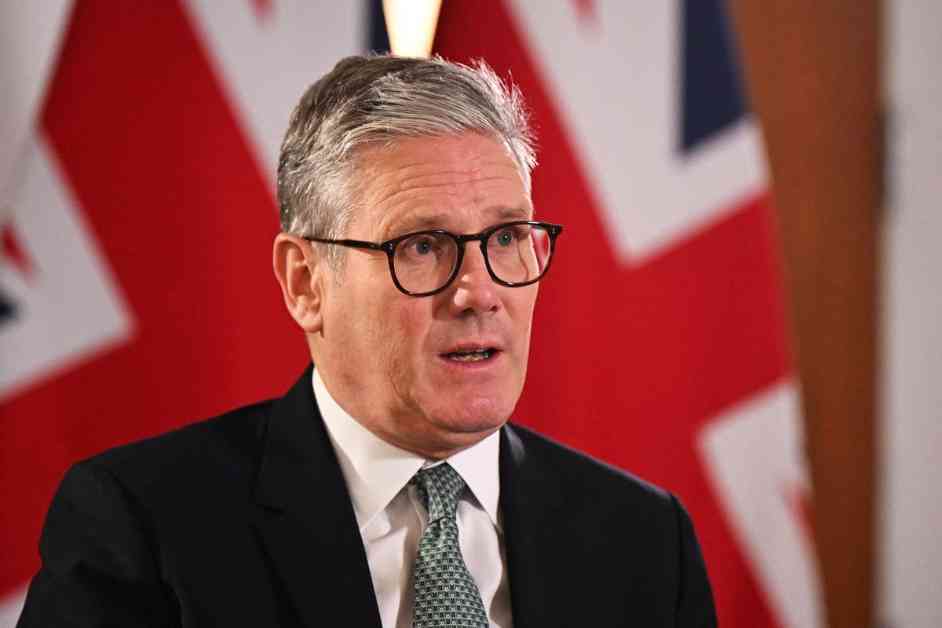Keir Starmer, the Labour Party leader, is set to deliver a speech at the United Nations General Assembly amidst escalating conflicts in the Middle East and setbacks in the UK. His address at the UN comes at a crucial time as the region teeters on the brink of all-out conflict, with ongoing violence in Ukraine and tensions in Sudan adding to the volatile situation.
Starmer’s speech is expected to focus on the UK’s commitment to global leadership and its role in addressing the various conflicts plaguing the world. The prime minister’s appearance at the UN follows a challenging week for the Labour Party, marked by internal rifts over winter fuel payment cuts and a failed attempt to reverse the decision.
Union members, led by Sharon Graham of the Unite union and the Communication Workers Union (CWU), staged a protest ahead of the Labour Party conference in Liverpool in response to the government’s cuts to the winter fuel allowance. The motion to reverse the cuts was passed by a show of hands at the conference, highlighting the discontent among Labour members over the policy.
In a show of defiance, Sharon Graham called on Labour members to rebel against the decision, emphasizing that the cuts do not align with the party’s values and the expectations of the people. The motion called for the scrapping of means testing for the winter fuel allowance, an end to fiscal rules restricting borrowing for investment, and the introduction of a wealth tax to address the financial shortfall.
As tensions escalate in the Israel-Hezbollah conflict, Scotland’s First Minister, John Swinney, expressed deep concern over the situation and called for safe passage for Scots caught up in the conflict. With Israel launching air strikes and Hezbollah firing missiles at central Israel, the violence in the region has reached a critical point, prompting calls for de-escalation and a peaceful resolution.
Meanwhile, the long-awaited report on the roots of the Windrush scandal is expected to shed light on the systemic issues that led to the mistreatment of the Windrush generation. The report, which was previously withheld by the Home Office, is seen as a crucial step towards transparency and accountability in addressing the injustices faced by the affected individuals.
In response to the report, Labour has pledged to offer a “fundamental reset moment” for the Windrush generation, with a focus on respect and dignity. Party leader Keir Starmer has committed to urgent reform of the compensation scheme, the restoration of the Windrush Unit within the Home Office, and the appointment of a Windrush commissioner to advocate for affected families.
As Starmer prepares to deliver his speech at the UN General Assembly, the Green party has voiced support for Unite’s call to scrap the winter fuel payment cuts and implement a wealth tax instead. Party co-leader Carla Denyer emphasized the need to prioritize the well-being of vulnerable groups, such as pensioners, and criticized the government’s approach to addressing the financial challenges.
In a surprising development, former cabinet minister Michael Gove has been appointed as the new editor of The Spectator magazine following its takeover by GB News. Gove’s transition from politics to journalism reflects the evolving landscape of media and politics in the UK, raising questions about the intersection of power and influence in the media industry.
As the political landscape continues to shift, the Tories have criticized the Labour Party conference for its handling of key issues, including the winter fuel payment cuts and the Windrush scandal. The debate over education tax and government priorities has sparked tensions between the two parties, highlighting the ongoing ideological divide in UK politics.
Overall, Keir Starmer’s appearance at the UN General Assembly comes at a critical juncture for the Labour Party and the UK as a whole. His speech is expected to address the pressing issues facing the world today, from conflicts in the Middle East to domestic challenges like the winter fuel payment cuts and the Windrush scandal. As the political landscape evolves, it remains to be seen how Starmer’s leadership will navigate these complex issues and shape the future direction of the country.












